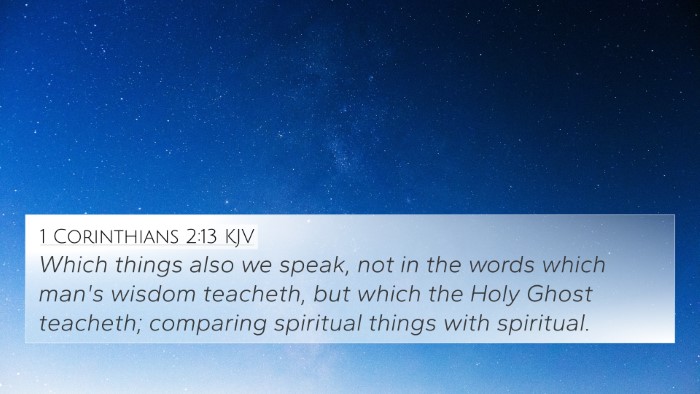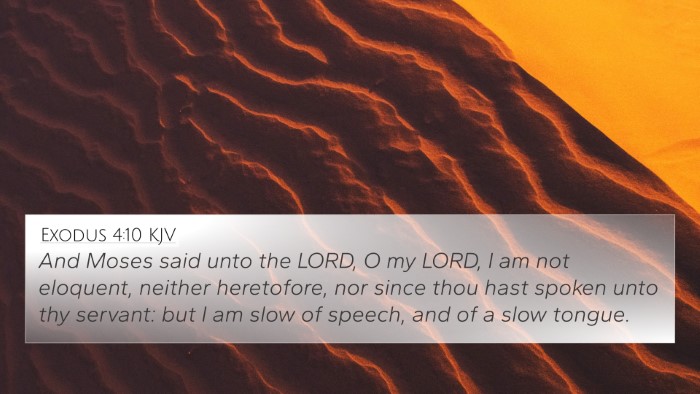Understanding 1 Corinthians 2:1
1 Corinthians 2:1 states, "And I, when I came to you, brothers, did not come proclaiming to you the testimony of God with lofty speech or wisdom." This verse captures the essence of the Apostle Paul’s approach to preaching and teaching in the early Christian church. The implications of this passage are profound and deserve careful examination.
Summary of the Verse
In this verse, Paul emphasizes his choice of simplicity over eloquence. He did not rely on persuasive rhetoric or human wisdom; rather, he focused on delivering the core message of the Gospel. This approach serves to highlight the divine power of God’s message rather than the capabilities of the messenger.
Insights from Public Domain Commentaries
-
Matthew Henry's Commentary:
Matthew Henry points out that Paul was not aiming to impress his audience with grandiloquent speech. Instead, he sought to convey the essential truths of the Gospel, which are often simple yet profound. This approach fosters a spirit of humility and reliance on God's wisdom rather than human intellect.
-
Albert Barnes' Notes:
Albert Barnes emphasizes that Paul’s deliberate choice to speak plainly allowed the message of Christ to shine through, unaffected by the sophistication of philosophical discourse popular in Corinth. He believed that the power of persuasion lies not in human eloquence, but in the Holy Spirit, who works in the believer's heart.
-
Adam Clarke's Commentary:
Adam Clarke elaborates on the context of Corinth, suggesting that the city's citizens placed great value on wisdom and oratory. By contrasting these values with his choice of message delivery, Paul aimed to challenge the status quo and redirect focus toward faith in Christ.
Bible Verse Cross-References
This verse is enriched by various other scriptures, creating connections and a deeper understanding of its meaning. Here are some key cross-references:
- 1 Corinthians 1:17: "For Christ did not send me to baptize, but to preach the gospel, and not with words of eloquent wisdom, lest the cross of Christ be emptied of its power." - This reinforces Paul’s intention to avoid reliance on oratory skill.
- Acts 18:24-25: This passage discusses Apollos, a learned man who spoke fervently, highlighting the contrast between human wisdom and divine revelation.
- 2 Corinthians 4:5: "For what we proclaim is not ourselves, but Jesus Christ as Lord, with ourselves as your servants for Jesus' sake." - Emphasizing the focus on Christ rather than personal abilities.
- 1 Thessalonians 1:5: "Because our gospel came to you not only in word, but also in power and in the Holy Spirit and with full conviction." - Highlights the reliance on the Holy Spirit rather than human capabilities.
- Galatians 6:14: "But far be it from me to boast except in the cross of our Lord Jesus Christ." - Paul’s commitment to remain humble about his message.
- 1 Peter 4:11: "Whoever speaks, as one who speaks oracles of God; whoever serves, as one who serves by the strength that God supplies." - True effectiveness in ministry comes from God.
- Matthew 11:25: "At that time Jesus declared, 'I thank you, Father, Lord of heaven and earth, that you have hidden these things from the wise and understanding and revealed them to little children.'" - God reveals truth to the humble, not the wise in their own eyes.
Inter-Biblical Dialogue
The connections between this verse and others outline a theme prevalent throughout scripture: the divine wisdom that supersedes human understanding. In studying Paul’s other epistles, it is clear that he prioritizes the power of the Gospel over personal credentials or rhetorical prowess.
Thematic Bible Verse Connections
The themes of humility, reliance on God, and the simplicity of the Gospel message are consistent throughout Pauline literature. This exemplifies the idea that true effectiveness in preaching arises from the Spirit's power, rather than human articulation.
Cross-Referencing Biblical Texts
Understanding how 1 Corinthians 2:1 connects to other scriptures can deepen one's comprehension of its implications, especially regarding how God chooses to communicate His message through humble vessels.
In conclusion, 1 Corinthians 2:1 serves as a powerful reminder of the importance of humility in ministry. Paul exemplifies how the message of Christ should be paramount, prioritizing divine revelation over human wisdom. This approach not only resonates through the life of Paul but is a central theme throughout the New Testament, making it relevant for today’s Christian faith and practice.























